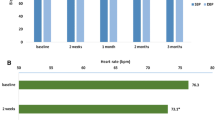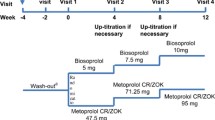Summary
General well-being, adverse effects and antihypertensive efficacy have been investigated in a double blind, parallel-group, dose-response multicentre study of diltiazem and metoprolol monotherapy for hypertension. 128 patients with primary hypertension were included from 10 participating centres. The patients were randomized to receive oral diltiazem 120–240–360 mg/day or metoprolol 50–100–200 mg/day. Each dose was given for a 4-week period as a forced titration regime. In all 119 patients, 59 and 60, respectively, on diltiazem and metoprolol completed the study protocol. There were dose-dependent reductions in supine and standing blood pressures (BP) after both diltiazem and metoprolol therapy. In the diltiazem group, supine BP was reduced by 10 (11)/10 (6) mm Hg (SBP/DBP) at the highest dose level, and the corresponding values for the metoprolol group were 7 (16)/8 (9) mm Hg (SBP/DBP). Target pressures (DBP ≤ 90 mm Hg and/or a reduction in DBP of ≥ 10%) were reached in 63% and 48% of the patients, respectively. The incidence and severity of dose-dependent adverse effects, as evaluated by spontaneous reports or open and direct questioning, did not differ between treatments. Subjective well-being, evaluated by a self-administered questionnaire, the MSE-profile, did not differ significantly between diltiazem and metoprolol therapy. However, after an initial slight deterioration, contentment and vitality tended to improve with increasing doses of diltiazem, while a dose-related deterioration in these variables was observed on metoprolol therapy. At the highest dose levels, contentment and vitality tended to be better in the diltiazem than the metoprolol group. Thus, diltiazem and metoprolol in daily doses of 120–360 mg and 50–200 mg, respectively, produce comparable and parallel reductions in supine and standing BP. However, while subjective well-being tended to improve with increasing doses of diltiazem, there was a negative trend for metoprolol. It is concluded that diltiazem, given as monotherapy to hypertensive patients, does not impair subjective well-being.
Similar content being viewed by others
References
The 1984 Joint National Committee (1984) The 1984 report of the Joint national committee on detection, evaluation and treatment of high blood pressure. Arch Int Med 144: 1045–1057
1988 Joint National Committee (1988) The 1988 report of the joint national committee on detection, evaluation and treatment of high blood pressure. Arch Int Med 148: 1023–1038
1989 Guidelines for the management of mild hypertension (1989) memorandum from a WHO/ISH Meeting. J Hypertens 7: 689–693
Treating mild hypertension (1989) Agreement from the large trials. Report from the British Hypertension Society working party. Br Med J 298: 694–698
Hedner T, Hansson L (1988) A utilitarian or deontological approach toward primary prevention of cardiovascular disease? Acta Med Scand 224: 293–302
Dahlöf C, Almkvist G, Dimenäs E et al. (1988) No difference in general well-being during antihypertensive treatment with atenolol or metoprolol CR. Ann Clin Res 20 [Suppl 48]: 42–50
Freestone S, Silas JH, Ramsay LE (1982) Sample size for short-term trials of antihypertensive drugs. Br J Clin Pharmacol 14(2): 265–268
Altman DG (1980) Statistics and ethics in medical research. III How large a sample? Br Med J 281: 1336–1338
Samuelsson O (1987) The natural course of untreated mild hypertension. National Board of Health and Welfare Drug Information Committee, Sweden 1: 11–32
Bulpitt CI, Dollery CT, Carne S (1976) Change in symptoms of hypertensive patients after referral to hospital clinic. Br Heart J 38: 121–128
Dimenäs E, Wiklund I, Dahlöf C, Lindvall KG, Olofsson BK, De Faire UH (1990) Differences in subjective well-being and symptoms between normotensives, borderline-hypertensives and hypertensives. J Hypertension 7: 885–890
Vandenburg MJ, Evans SJV, Kelly BJ, Bradshaw F, Currie WJC, Cooper WD (1984) Factors affecting the reporting of symptoms by hypertensive patients. Br J Clin Pharmacol 10: 189–195
Siegrist J, Matschinger H, Motz W (1987) Untreated hypertensives and their quality of life. J Hypertension 5 [Suppl 1]: 15–20
Jachuck SJ, Brieley H, Jachuck S et al. (1982) The effect of hypotensive drugs on the quality of life. JR Coll Gen Pract 32: 103–105
Dahlöf C, Dimenäs E, Olofsson B (1989) Documentation of an instrument especially designed for assessment of subjective CNS-related symptoms during cardiovascular pharmacotherapy. Cardiovasc Drugs Ther 3: 919–927
Beufield P, Clissold SP, Brogden RN (1986) Metoprolol. An updated review of its pharmacodynamic and pharmacokinetic properties, and therapeutic efficacy in hypertension, ischemic heart disease and related cardiovascular disorders. Drugs 31: 376–429
Chaffman M, Brogden RN, (1985) Diltiazem A review of its pharmacological properties and therapeutic efficacy. Drugs 29: 387–454
Trimarco B, DeLuca N, Ricciardelli B, Volpe M, Veniero A, Cuocolo A, Cicala M (1984) Diltiazem in the treatment of mild to moderate essential hypertension: comparison with metoprolol in a crossover double-blind trial. J Clin Pharmacol 24: 218–227
(1984) Dupuy HI. The psychological general well-being (PGWB) index. In: Wenger NK, Mattsson ME, Furberg CD, Elinson J (eds) Assessment of quality of life in clinical trials of cardiovascular therapies. Le Jacq, Washington, D.C., USA, pp 170–183
Gengo FM, Fagan SC, de Padova A, Miller JK, Kinkel PR (1988) The effect of beta-blockers on mental performance of older hypertensive patients. Arch Int Med 148: 779–784
Dimenäs E, Dahlöf C, Olofsson B, Wiklund I (1989) CNS-related subjective symptoms during treatment with beta1-adrenoceptor antagonists (atenolol, metoprolol): two double-blind placebo controlled studies. Br J Clin Pharmacol 28: 527–534
Dimenäs E, Dahlöf C (1990) Tolerability and well-being with metoprolol in a controlled-release (CR/ZOK) formulation: A review article. J Clin Pharmacol 30 [Suppl]: 92–97
Hollenberg KN (1987) Initial therapy in hypertension. Quality of life considerations. J Hypertension 5 [Suppl 1]: 3–7
Williams GH (1988) Beyond blood pressure control. Effect of antihypertensive therapy on quality of life. Am J Hypertens 1: 363–365
Croog SH, Levine S, Testa M et al. (1986) The effects of antihypertensive therapy on the quality of life. N Eng J Med 314: 1657–1664
Author information
Authors and Affiliations
Additional information
The Swedish Diltiazem-Metoprolol Multi-Centre Study Group
T. Hedner MD PhD, J. Hedner MD PhD, B. Persson MD PhD (Gothenburg); T. Thulin MD PhD, G. Persson MD PhD (Lund); T. Lundström MD (Skövde); N. Henningsen MD PhD (Malmö); E. Trell MD PhD, S. Gustafsson MD (Sunne); M. Danielson MD PhD (Stockholm); P. Engfeldt MD PhD, H. Wahrenberg MD, PhD (Huddinge); B. Hedbäck MD PhD (Oskarshamn); A. Nilsson MD, P. Katzman MD PhD (Helsingborg); L. Andrén MD PhD, K. Rennblad-Börner MD, T. Valdimarsson MD, I. Wallin MD (Gothenburg); P. Nilsson-Ehle MD PhD, U. Thilén MD, G. Berglund MD PhD (Lund-Malmö); C. Dahlöf MD PhD (Gothenburg)
Monitors: S.-O. Olsson PhD, J. Johansson, E. Berglund, B. Dahlström (Malmö)
Statisticians: J. Ringström BSc, L. Jergle BSc (Malmö)
Secretaries: C. Mardell, A.-C. Svensson, M. Olsson (Malmö)
Rights and permissions
About this article
Cite this article
Dahlöf, C., Hedner, T., Thulin, T. et al. Effects of diltiazem and metoprolol on blood pressure, adverse symptoms and general well-being. Eur J Clin Pharmacol 40, 453–460 (1991). https://doi.org/10.1007/BF00315222
Issue Date:
DOI: https://doi.org/10.1007/BF00315222




